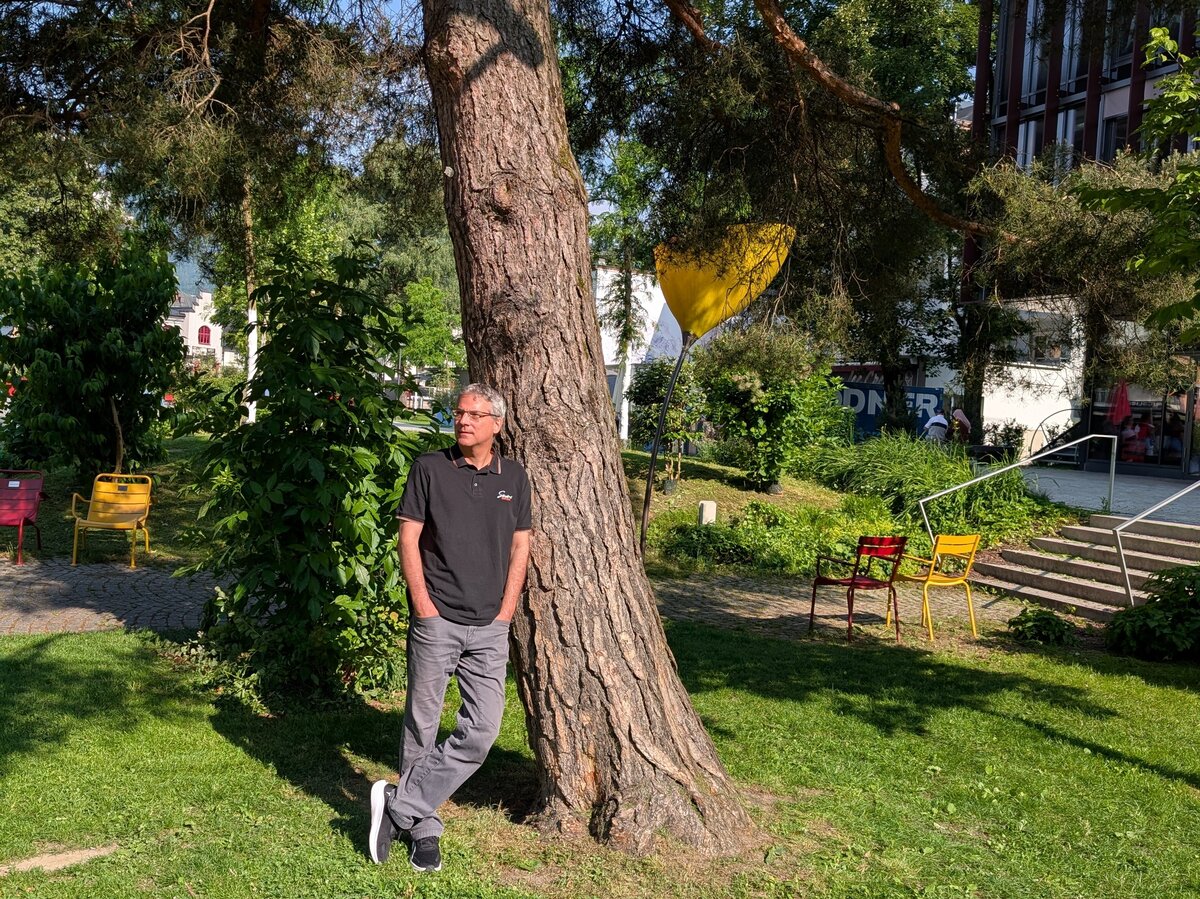IN THE SERVICE OF NATURE - BETWEEN PROFESSION AND VOCATION
- 02.08.2025
- News Study Program

Prof. (FH) Dr Peter Schneckenleitner in the city park at the University of Applied Sciences Kufstein Tirol - leaning against a tree, surrounded by colourful chairs, greenery and urban flair on a sunny day.
Dr Peter Schneckenleitner, Professor (FH) of Communication Management, is also a nature conservation officer for the province of Tyrol. In this interview, he talks about his motivation, challenges and why nature conservation is a matter close to his heart.
Prof. (FH) Dr Peter Schneckenleitner teaches and researches at the University of Applied Sciences Kufstein Tirol - and also takes on responsibility in the service of nature: since the beginning of the year, he has been an honorary nature conservation officer for the districts of Kitzbühel, Kufstein and Schwaz.
In this role, he contributes his nature-loving attitude as well as his experience in communication and conflict resolution. In this interview, he explains how he came to this position, what motivates him and what tasks await him.
HOW DID YOU COME TO TAKE ON THE ROLE OF NATURE CONSERVATION OFFICER?
Prof. (FH) Dr Peter Schneckenleitner: The Tyrolean Environmental Ombudsman is represented by honorary nature conservation officers in nature conservation authorisation procedures at the district administrative authorities. Now that some colleagues are retiring, new honorary nature conservation officers are always being sought. The job advertisements with a detailed job profile are advertised in the regional newspapers. I applied for the position two years ago, went through an application process and an almost one-year training phase and am now a volunteer nature conservation officer for the province of Tyrol.
WHAT MOTIVATES YOU PERSONALLY TO GET INVOLVED IN NATURE CONSERVATION?
Schneckenleitner: Our nature is something fantastic. In my youth, I planted hundreds of trees in reforestation projects, I love being out in nature and in the mountains, so it's only natural that I should also get involved in this issue.
TO WHAT EXTENT DOES YOUR WORK AS A NATURE CONSERVATION OFFICER COMPLEMENT YOUR ROLE AS A PROFESSOR OF COMMUNICATION MANAGEMENT?
Schneckenleitner: Ultimately, there are always people behind all nature conservation projects. Communication is the link between people and, in this respect, expertise can certainly do no harm.
WHAT SPECIFIC TASKS AND RESPONSIBILITIES DOES YOUR WORK INVOLVE?
Schneckenleitner: My main task is to represent the interests of my client Nature & Environment in nature conservation proceedings in the best possible way. Regionally, I am responsible for the districts of Kitzbühel, Kufstein and Schwaz. The Environmental Ombudsman's Office is part of the Tyrolean provincial administration. I carry out my work on an honorary basis and am appointed for five years at a time and extended if necessary.
WHAT CHALLENGES DO YOU REGULARLY FACE IN YOUR ROLE - ORGANISATIONAL, POLITICAL OR SOCIAL?
Schneckenleitner: Well, of course you don't always want to be seen as an obstructionist. It is important that we work together with the applicants and planners to find solutions or alternatives that are sustainable and nature-friendly. The Environmental Ombudsman's Office is a party to around 1,200 authorisation procedures per year. We issue detailed statements on each of these projects - be it the installation of photovoltaic systems on open spaces, the construction of landfills or lifts, the building of new forest roads, car parks, buildings, huts or major projects such as the Brenner Base Tunnel.
THOSE WHO WORK FOR NATURE ALSO WORK FOR PEOPLE.
Prof. (FH) Dr Peter Schneckenleitner
Professor (FH) for Communication Management
WHY IS NATURE CONSERVATION MORE IMPORTANT THAN EVER TODAY - ALSO IN TYROL?
Schneckenleitner: Nature and humans are connected in many ways. On the one hand, there is an ecological dependency. This means that clean air, clear water and healthy food are all elements that are vital for the survival of our society. But of course there are also economic components that need to be considered. In Tyrol in particular, unspoilt nature is the USP for the entire tourism industry. And then there are other major issues such as climate change. To put it in a nutshell: If you work for nature, you also work for people.
TO WHAT EXTENT DO YOU SEE A CHANGE IN THE PUBLIC PERCEPTION OF NATURE CONSERVATION AND ENVIRONMENTAL PROTECTION?
Schneckenleitner: In Tyrol in particular, there has always been a tension between ecology and economy. However, nature is a limited resource. Once it is used up, it only comes back very slowly - if at all. I think this realisation is now well known in society as well as in politics and business. So it's all the better that as a nature conservation officer you can really make a difference here.
WHAT ADVICE WOULD YOU GIVE TO YOUNG PEOPLE WHO WANT TO GET INVOLVED IN NATURE, THE ENVIRONMENT AND SUSTAINABILITY?
Schneckenleitner: It's always good to reflect critically on your own situation first. What about my sustainable behaviour in general? Topics such as plastic consumption, nutrition, clothing, mobility or conscious consumption in general should be mentioned here. I think we can all still optimise a few things. And then, of course, there are also opportunities to get directly involved in organisations, be it in the political sphere, in activism or directly in environmental protection, for example with the Alpine Association.
